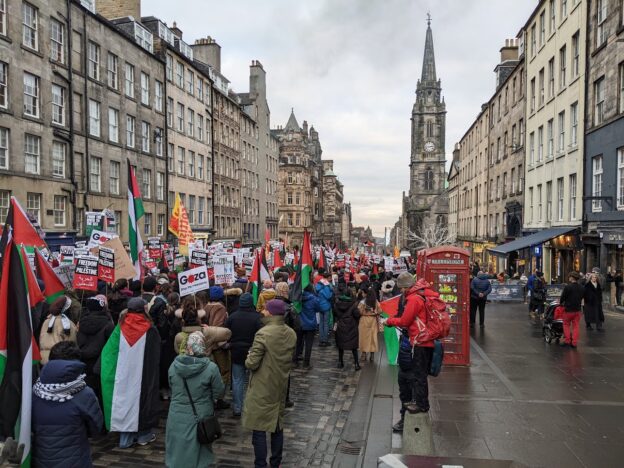On March 1st, Rishi Sunak gave his first Prime Ministerial address from the steps of 10 Downing Street. It was late on a Friday afternoon, and apparently organised rather hastily. What necessitated such an urgent, national response?
“A shocking increase in extremist disruption and criminality”, Sunak said, which “demands a response not just from government, but from all of us”. As many commentators noted, it was not clear exactly what “extremist disruption and violence” he was referring to. The protest marches against Israel’s campaign in Gaza has been one of the largest and most peaceful in British history, with arrest rates way lower than the Glastonbury Festival or a Premier League football match. The only violence that has been seen was not from the protestors at all, but by counter-protestors, including individuals formerly associated with the far-right English Defence League, after being encouraged by the then-Home Secretary Suella Braverman.
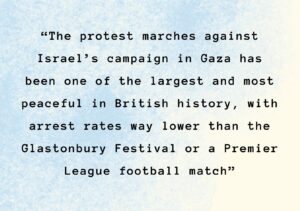
Yet, according to Sunak,
Jewish children fearful to wear their school uniform lest it reveal their identity. Muslim women abused in the street for the actions of a terrorist group they have no connection with… You can be a practising Hindu and a proud Briton as I am. Or a devout Muslim and a patriotic citizen as so many are. Or a committed Jewish person and the heart of your local community… and all underpinned by the tolerance of our established, Christian church.
It seems clear that Sunak was not responding to any real threat, but rather attempting to deflect from a wave of his ministers being accused of racism and Islamophobia, provide cover for the Commons’ Speaker Lindsay Hoyle breaking Parliamentary procedure to pass Labour’s ceasefire motion rather than the SNP’s more critical one, and to connect all this with the protests which have taken place weekly across the UK since October 2023 and which directly oppose the Government’s position of support for Israel’s military actions. These protests have been overwhelmingly peaceful, organised according to the law with the support of the Police, and do not represent an extremist minority, but rather the views of 66% of the population today, up from 59% in November 2023. Nor are the protestors predominantly Muslim, but represent a cross-section of the British public—including many Jewish people.
But from Sunak’s speech, and Michael Gove’s widely criticised redefinition of extremism which followed, you would get the impression of a state of emergency, almost a civil war in which the Christian majority are embattled with a wave of Muslim immigrants.
The reality could hardly be more different. As shown by the 2021 census, we know that the percentage of the English population identifying as Christian has been dropping at a steady rate of 1.3% of the population per year since at least 2001, and was 46.2% in 2021 (in Scotland it is even lower). The UK is no longer a Christian majority country, and if current trends continue, will be a majority “No Religion” by the next census. And for all Sunak and Gove’s scaremongering, there is no wave of Muslim immigrants threatening the UK. They amount for only 6.5% of the population, 3.9 million, an increase of only 800,000 (the number of people on the biggest London march) over the last decade.
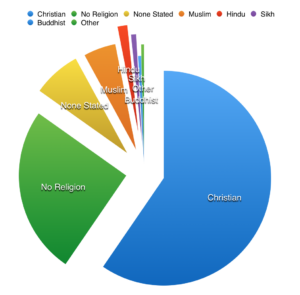
Figure 1. UK Religion 2011 Census
(Religious composition, 2011 and 2021, England and Wales. Source: ONS. https://www.ons.gov.uk/peoplepopulationandcommunity/culturalidentity/religion/bulletins/religionenglandandwales/census2021)
The decline of Christian identification was matched by a rise in “no religion”, not Islam. So to frame the protests as two religions clashing, as Sunak does, is at best ignorant, and at worst risks heightening tensions and even encouraging violence, as Braverman did when she called peace protests “hate marches” and accused the police of double standards (implying religious discrimination in favour of Muslims).
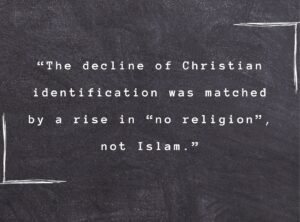
So what’s going on? The politics of Israel-Gaza are a factor, to be sure, but there are other influences at work here. While the antisemitism crisis in the Labour Party under Corbyn is well-known, there have been regular accusations of Islamophobia within the Conservative party since at least 2011, notably including by the Tory Peer Baroness Warsi who said it “right up to the top” of the Party. The Muslim Council of Britain accused the Tories of responding with “denial, dismissal and deceit” after Boris Johnson wrote in The Spectator that “To any non-Muslim reader of the Koran, Islamophobia—fear of Islam — seems a natural reaction, and, indeed, exactly what that text is intended to provoke.” In 2019, anti-Muslim incidents almost quadrupled after Johnson described a woman wearing a burqa as “looking like a bank robber” in a newspaper column. Deputy Party Chairman Lee Anderson was fired for stating that London Mayor Sadiq Khan was under the control of “Islamists”. It’s not just MPs—a 2020 report by Hope Not Hate found that 57% of Conservative Party members had a negative attitude towards Islam also.
Michael Gove has been accused of anti-Muslim rhetoric previously, however. In 2006, he published Celsius 7/7, which argues for a “widespread reluctance to acknowledge the real scale and nature of the Islamist terror threat” from “a sizeable minority” of British Muslims holding “rejectionist Islamist views” which he describes as comparable to the threat from Nazism. Citing the “clash of civilisations” thesis argued by Bernard Lewis, “the chief ideologue of post-9/11 politics of hate towards Islam and Muslims”, its many errors of fact are best addressed by William Dalrymple’s review. Gove was heavily criticised for his handling of the so-called “Trojan Horse” affair in Birmingham in 2014, in which fraudulent letters accusing Muslims of attempting to “infiltrate” schools were taken so seriously that Gove appointed the former head of the Metropolitan Police counter-terrorism unit as Education Commissioner. It should not therefore be surprising that several Muslim groups are singled out as targeted by Gove’s new “extremism” definition.
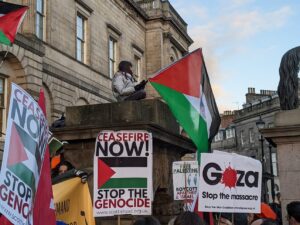
Figure 2. Protests in Edinburgh. Photo: David Robertson
Gove has long had an association with Paul Marshall, a hedge fund co-owner and philanthropist worth upwards of £800m. A committed Charismatic Evangelical, he has over the last decade or so spent tens of millions of pounds supporting Holy Trinity Brompton (home of the Alpha Course and very influential within the C of E), and promoting a renewal of British liberalism through faith and charity. This has included donations to the Brexit campaign and Gove’s Tory Party leadership campaign in 2016, because “traditional British liberalism rests on the Judeo-Christian understanding that we are all, in moral terms, fallen creatures… Somewhere amid the arrogance of the Enlightenment, we lost this sense of fallenness”. This rather anti-modern vision led him to become a major shareholder in the populist right TV channel, GB News, and is currently bidding to buy The Spectator. GB News has been censured by the industry regulator OFCOM numerous times for spreading disinformation and conspiracy theories, including anti-vaccine claims, climate denial and Great Replacement theories, in which immigration is not caused by wars, poverty, natural disasters and the climate crisis, but in fact through a deliberate attempt to destabilise white, Christian Europe by replacing the population.
In February 2024, Hope Not Hate revealed that Marshall’s private Twitter account had been sharing and liking posts expressing such views, including one saying “If we want European civilization to survive we need to not just close the borders but start mass expulsions immediately.” Indeed, in places, Sunak’s portrayal of a unified, Christian, democratic Britain under siege from extremist Muslim immigrant mobs echo the rhetoric of populist right-wing leaders throughout Europe and the world. In this, Sunak’s words are closer to the ideas of Donald Trump, Georgia Meloni, Geert Wilders, Tommy Robinson or Anders Breivik, than with the average Briton today.
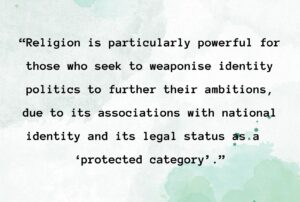
Therefore, I push back strongly against the claim that the protests are predominantly motivated by religious tensions. Rather, religion is particularly powerful for those who seek to weaponise identity politics to further their ambitions, due to its associations with national identity and its legal status as a “protected category”. I do agree with one thing Sunak said, however—the UK is “the world’s most successful multi-ethnic, multifaith democracy”, and one of the most tolerant and progressive countries on the planet. I am no nationalist, but that is something we can be genuinely proud of. But if a small number of religiously-motivated extremists are indeed using hate and division to destabilise our democracy, they’re politicians, not protestors.

